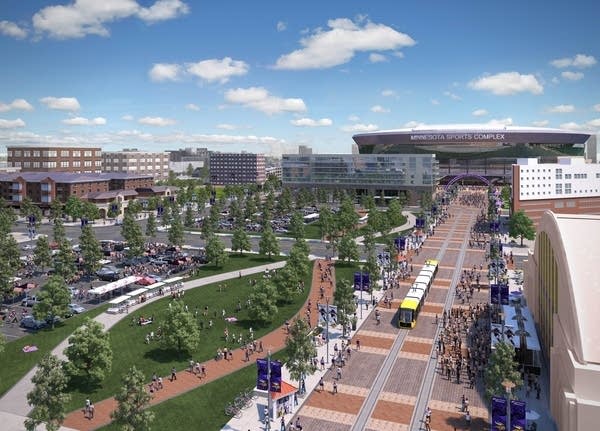Vikings stadium bill: House, Senate versions compared
Go Deeper.
Create an account or log in to save stories.
Like this?
Thanks for liking this story! We have added it to a list of your favorite stories.

By MPR News staff
ST. PAUL, Minn. — Both the Minnesota House and Senate have given the green light to bills that finance the construction and operation of a $975-million Vikings stadium in Minneapolis at the Metrodome site. Now, a conference committee has to meet and work out the differences between the two bills, which were each changed during the floor debates.
(Editor's update: The compromise bill approved by the conference committee won House approval early Thursday morning, May 10.)
Here's where the two bills are similar:
Turn Up Your Support
MPR News helps you turn down the noise and build shared understanding. Turn up your support for this public resource and keep trusted journalism accessible to all.
• The upfront costs of constructing the facility would be paid by the state, the City of Minneapolis and the Vikings.
• The Minneapolis share of the up- front contribution is set at $150 million.
• The stadium will have a roof, seat 65,000 fans and cost about $20.5 million a year to operate.
• The Vikings would sign a 40-year lease to play in the new facility.
• The state's share of the financing costs would be covered by authorizing and generating revenue from electronic pull-tab gambling and bingo.
Here are some places where the bills differ:
• The House bill calls for the Vikings to contribute $532 million for the stadium. The Senate calls for Vikings to pay $452 million.
• The House sets the state share of financing at $293 million. The Senate sets it at $373 million.
• The Senate bill calls for part of the financing to come from fees on memorabilia sold in the stadium, on parking and on luxury suites. The House bill does not.
• The House bill legalizes sports-themed gambling tip boards to raise money for the stadium. The Senate bill does not.
• The House bill gives the Vikings an exclusive opportunity to attract a professional soccer team that could play at the stadium for five years rent free. The Senate bill does not.
• The House bill allows the public to share revenue from stadium naming rights. The Senate bill does not.
• The Senate bill allocates $2.7 million a year for 20 years to the City of St. Paul for capital costs related to building new sports facilities or renovating existing ones. The House bill doesn't
• The Senate bill bans blackouts of televised NFL games. The House bill has no language related to television broadcasts.
• The Senate bill includes some tax provisions unrelated to the stadium that the House does not, including a requirement that internet retailers collect sales taxes from Minnesota residents and an extension of the tax increment financing district north of the Mall of America in Bloomington.
The House and Senate have only two working days left to wrap up the session, and they both will have to vote on whatever the conference committee comes up with.
Dear reader,
Political debates with family or friends can get heated. But what if there was a way to handle them better?
You can learn how to have civil political conversations with our new e-book!
Download our free e-book, Talking Sense: Have Hard Political Conversations, Better, and learn how to talk without the tension.





